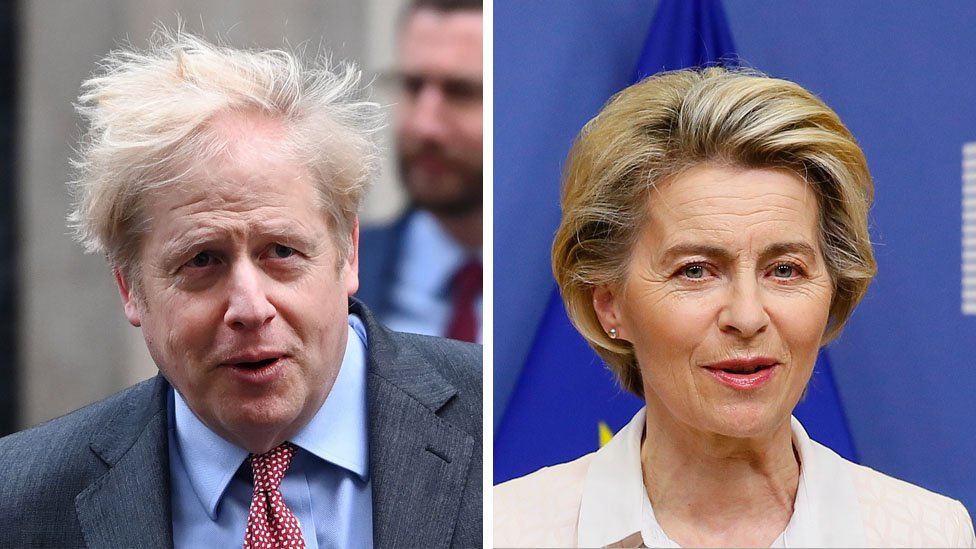
Time is running out to reach a deal before 31 December, when the UK stops following EU trading rules.
The pair will hold talks over dinner, after negotiations between officials ended in deadlock.
Major disagreements remain on fishing rights, business competition rules and how a deal will be policed.
At the dinner, expected to begin at 19:00 GMT, Prime Minister Johnson will work through a list of the major sticking points with Mrs von der Leyen, who is representing the leaders of the 27 EU nations.
A UK government source said progress at a political level may allow the negotiations - between the UK's Lord Frost and EU's Michel Barnier - to resume over the coming days.
But the source added that it was important to be "realistic" that an agreement might not be possible.
EU sources told the BBC that Mr Barnier briefed the bloc's Europe ministers that talks were tilting towards no deal being reached before the deadline.
Cabinet Office minister Michael Gove said "there needed to be movement from both sides" but added that the UK wanted to be "in control of its own rules and regulations".
He also said that: "Often, around the table when you have two political principles one-on-one you can often find a way through."
Mr Johnson will take part in Prime Minister's Questions before travelling to the Belgian capital. EU leaders are due to meet for a summit of their own on Thursday.


The purpose of Wednesday's dinner is not to call a halt to talks. But nor is the purpose to proclaim that a deal's been done.
The reason for the meeting is to see if both sides are willing in principle to tolerate the notion of budging, after the negotiations, and frankly negotiators, have been exhausted.
If the prime minister and Mrs von der Leyen can look each other in the eye and agree that there are still compromises to be had, then a deal is still possible.
If they are willing to make that kind of pact - to say privately to each other, I'm willing to budge if you are too - then that would in theory allow technical talks to get going again.

In separate talks on Tuesday, the UK and EU reached an agreement on specific trade arrangements for Northern Ireland - including on post-Brexit border checks and trading rules for NI, and how the new Irish Sea border will work.
It means the UK has now dropped plans to override sections of its EU exit agreement signed last year, which would have potentially broken international law.
Conservative MP Sir Roger Gale told the BBC's Newsnight he did not think Downing Street "quite understands the degree of antipathy throughout the European Union" toward the UK's plan to override the divorce deal, which he called an "expression of bad faith".
Details of the NI agreement have not yet been published, but Cabinet Office minister Michael Gove is expected to make a statement in the Commons on Wednesday.
The agreement was an important moment for businesses, said BBC Northern Ireland political reporter Jayne McCormack. "But some firms and political parties may be less receptive when they see the finer details of what's been decided," she said.
Speaking to the BBC, Mr Gove confirmed that EU officials would be present in Northern Ireland "to make sure the processes, that we are in control of, will be running appropriately".
Former Conservative leader Iain Duncan Smith said there would be a need "for some explanation" from the government because MPs had been "assured by the government that there were would be no customs officials sitting around".

Brexit - The basics
- Brexit happened but rules didn't change at once: The UK left the European Union on 31 January 2020, but leaders needed time to negotiate a deal for life afterwards - they got 11 months.
- Talks are happening: The UK and the EU have until 31 December 2020 to agree a trade deal as well as other things, such as fishing rights.
- If there is no deal: Border checks and taxes will be introduced for goods travelling between the UK and the EU. But deal or no deal, we will still see changes.

The UK and EU are at loggerheads over the so-called "level playing field" - a set of shared rules and standards to ensure businesses in one country do not have an unfair advantage over their competitors in others.
Brussels wants the UK to follow EU rules closely in areas such as workers' rights and environmental regulations, but the UK says the goal of Brexit is to break free from following common rules and reassert national sovereignty.
And the two sides disagree on how any future trading disputes should be resolved.
On fishing, the two sides continue to haggle over how much access European fishing boats should have to British waters, and how much they would be allowed to catch from next year.



How will Brexit affect you? Do you have any questions? Get in touch by emailing haveyoursay@bbc.co.uk.
Please include a contact number if you are willing to speak to a BBC journalist. You can also get in touch in the following ways:
- WhatsApp: +44 7756 165803
- Tweet: @BBC_HaveYourSay
- Please read our terms & conditions and privacy policy
If you are reading this page and can't see the form you will need to visit the mobile version of the BBC website to submit your question or comment or you can email us at HaveYourSay@bbc.co.uk. Please include your name, age and location with any submission.
World - Latest - Google News
December 09, 2020 at 03:35PM
https://ift.tt/33SjfDq
Brexit: Boris Johnson to meet Ursula von der Leyen for trade deal talks - BBC News
World - Latest - Google News
https://ift.tt/2SeTG7d
Bagikan Berita Ini














0 Response to "Brexit: Boris Johnson to meet Ursula von der Leyen for trade deal talks - BBC News"
Post a Comment